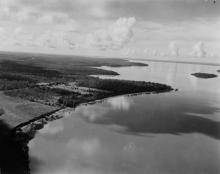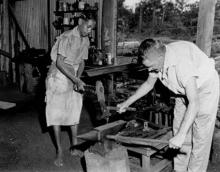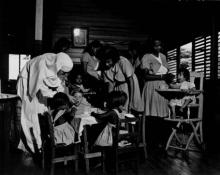Melville Island
Garden Point Mission was opened to prevent Aboriginal and Torres Strait Islander communities from interacting with East Asian and South East Asian traders. Children who were labelled as 'half caste' by legislation and government policy were often forcibly removed from their families and taken to Garden Point . A former staff member admitted that government policy and Garden Point "broke up a lot of families" . The children at Garden Point were seen as a problem because they had both an Aboriginal or Torres Strait Islander parent and a parent from an East Asian or South East Asian background . A report about the mission said that the children "are not natives nor can be considered in the same category" . Because of this, Garden Point focussed on "the problem of the future of these children" . Federal policy stated that "the half caste [children] should be scattered amongst the white race throughout Australia and be gradually absorbed by the whites" . One resident was told by the mission that his sister and several other young children had died after being removed from their families, even though his sister was alive and trying to find him .
0Established in 1941 by the Catholic Church, closed in 1969.
Garden Point MissionRegina Ganter, Garden Point, Melville Island 1940-1962, German Missionairies in Australia http://missionaries.griffith.edu.au/mission/garden-point-melville-island-1940-1962
ABC, 'My Island Church', Compass, 6 April 2014, (Geraldine Doogue) http://www.abc.net.au/compass/s3961785.htm
Regina Ganter, Garden Point, Melville Island 1940-1962, German Missionairies in Australia, para 8 http://missionaries.griffith.edu.au/mission/garden-point-melville-island-1940-1962
Zita Wallace - Every Hill Got A Story (Central Land Council, 2016) 2:39, https://soundcloud.com/nitv-1/zita-wallace-2015-2
NTMetropolitan Local Aboriginal Land Council
http://metrolalc.org.au/
Keith Vincent Smith, Aboriginal History - Wallumedegal (10 May 2017) City of Ryde
http://www.ryde.nsw.gov.au/Library/Local-and-Family-History/Historic-Ryde/Aboriginal-History
It was this kind of instant recognition. I looked like her, you know? It was really nice. She just kind of ran up to me and threw her arms around me and gave me a hug and that was really nice. And then suddenly there was all these brothers coming out of the woodwork. I didn't know I had any siblings. And uncles and aunts and cousins. Suddenly everyone was coming around to meet me (p. 203).
Confidential evidence 439, New South Wales: NT woman removed to Garden Point Mission at 3 days in the 1960s; adopted into a non-Indigenous family at 3 years; reunited with her birth mother in the presence of her adoptive mother at 21.
Human Rights and Equal Opportunity Commission, Bringing them Home: National Inquiry into the Separation of Aboriginal and Torres Strait islander Children from Their Families (1997)
3 days Confidential evidence 439My grandmother was taken from up Tennant Creek. What gave them the right to just go and take them? They brought her down to The Bungalow [at Alice Springs]. Then she had Uncle Billy and my Mum to an Aboriginal Protection Officer. She had no say in that from what I can gather. And then from there they sent her out to Hermannsburg - because you know, she was only 14 when she had Uncle Billy, 15 when she had Mum. When she was 15 and a half they took her to Hermannsburg and married her up to an Aranda man. That's a no-no. And then from there, when Mum was 3, they ended up taking Mum from Hermannsburg, putting her in The Bungalow until she was 11.
And then they sent her to Mulgoa mission in New South Wales. From there they sent her to Carlingford Girls' Home to be a maid. She couldn't get back to the Territory and she'd had a little baby.
Agnes [witness's sister] and I have met him [their older brother]. We met him when he was 35. He's now 42 so that's not that far away. Mum had him and she was working but she doesn't know what happened to her money. When she kept asking for her money so she could pay her fare back to Alice Springs they wouldn't give her any.
I've got paperwork on her from Archives in New South Wales. There's letters - stacks of 'em - between the Aboriginal Protection Board, New South Wales, and Northern Territory. All on my mother. They were fighting about which jurisdiction she was in - New South Wales yet she was a kid from the Northern Territory. So one State was saying we're not paying because she's New South Wales, they should pay.
In the end New South Wales said to Mum, 'I'll pay your fare back on the condition that because you haven't got a husband and you've got a baby, you leave that baby here'. So she left her baby behind and came back to the Territory.
And then she had me and then my brother and another two brothers and a sister and we were all taken away as soon as we were born. Two of them were put in Retta Dixon and by the time they were 18 months old they were sent down south and adopted. She had two kids, like they were 15 months apart, but as soon as they turned 18 months old they were sent down south and adopted out.
One of them came back in 1992. He just has that many problems. The others we don't know where they are. So it's like we've still got a broken family.
I was taken away in 1950 when I was 6 hours old from hospital and put into Retta Dixon until I was 2 months old and then sent to Garden Point. I lived in Garden Point until 1964. And from Garden Point, Tennant Creek, Hermannsburg. While in Garden Point I always say that some of it was the happiest time of my life; others it was the saddest time of my life. The happiest time was, 'Yippee! all these other kids there'. You know, you got to play with them every day. The saddest times were the abuse. Not only the physical abuse, the sexual abuse by the priests over there. And they were the saddest because if you were to tell anyone, well, the priests threatened that they would actually come and get you.
Everyone could see what they were doing but were told to keep quiet. And just every day you used to get hidings with the stock-whip. Doesn't matter what you did wrong, you'd get a hiding with the stockwhip. If you didn't want to go to church, well you got slapped about the head. We had to go to church three times a day. I was actually relieved to leave the Island.
In 1977 I had three children. In 1977 my oldest was three years old then. I had another one that was twelve months and another one that was two months old. All those kids were taken off me. The reason behind that was, well, I'd asked my girl-friend and so-called sister-in-law if she could look after my kids. She wouldn't look after my daughter because my daughter's black. So, she said she'd take the two boys and that was fine. And while I was in hospital for three months - that's the only reason I asked them to take 'em 'cause I was going to hospital because I had septicaemia.
I couldn't get my kids back when I came out of hospital. And I fought the welfare system for ten years and still couldn't get 'em. I gave up after ten years. Once I gave up I found out that while I was in hospital, my sister-in-law wanted to go overseas with my two boys 'cause her husband was being posted there for 12 months from foreign affairs. And I know she brought some papers in for me to sign while I was in hospital and she said they were just papers for their passports. Stupid me, being sick and what-have-you didn't ask questions - I signed 'em and found out too late they were adoption papers. I had 30 days to revoke any orders that I'd signed.
And with my daughter, well she came back in '88 but things just aren't working out there. She blames me for everything that went wrong. She's got this hate about her - doesn't want to know. The two boys know where I am but turned around and said to us, 'You're not our mother - we know who our real mother is'.
So every day of your bloody life you just get hurt all the time ... (p. 127-129)
Confidential evidence 557, Northern Territory
Human Rights and Equal Opportunity Commission, Bringing them Home: National Inquiry into the Separation of Aboriginal and Torres Strait islander Children from Their Families (1997)
Birth Confidential evidence 557 - EvieMarita AhChee, forcibly removed from her mother when she was six years old, talks about taking a job in Alice Springs when she was 20 years old to find her mother:
"Somebody must have told Mum that I was in town. She walked, knocking on every door in Arunga Street. She went across and that and when she went to the house opposite where I was staying and this woman said to her, 'Try in that house there, there's a new girl there.' So she came and I opened the door.
Straight away I remembered her. I said, 'Mum!' I said, 'Come in Mum.' She couldn't talk for about five minutes. She came in and I said, 'Come and sit down, Mum.' She sat down and she's going .... I said, 'No, Mum, I'm too big now.' She said like that, so I just sat on her to make her happy and she hugged me and I hugged her. We had a good cry both of us. She cried and I cried, it was so lovely to see her. That's the first time I'd seen her in all those years I'd been away. I'd been away nearly 13 or 14 years on the mission with no contact with anyone. I didn't know my Mum will be still alive. I knew her straight away. I remembered that face."
Marita AhChee, Marita AhChee, Stolen Generations' Testimonies, [22]-[23]
http://stolengenerationstestimonies.com/index.php/testimonies/1018.html

Garden Point Mission, 1958: Aerial view of the complex, including Kings Cove and Harris Island

Garden Point Mission, 1958: Training at the blacksmith

Garden Point Mission, 1958: Dinner at the nursery
